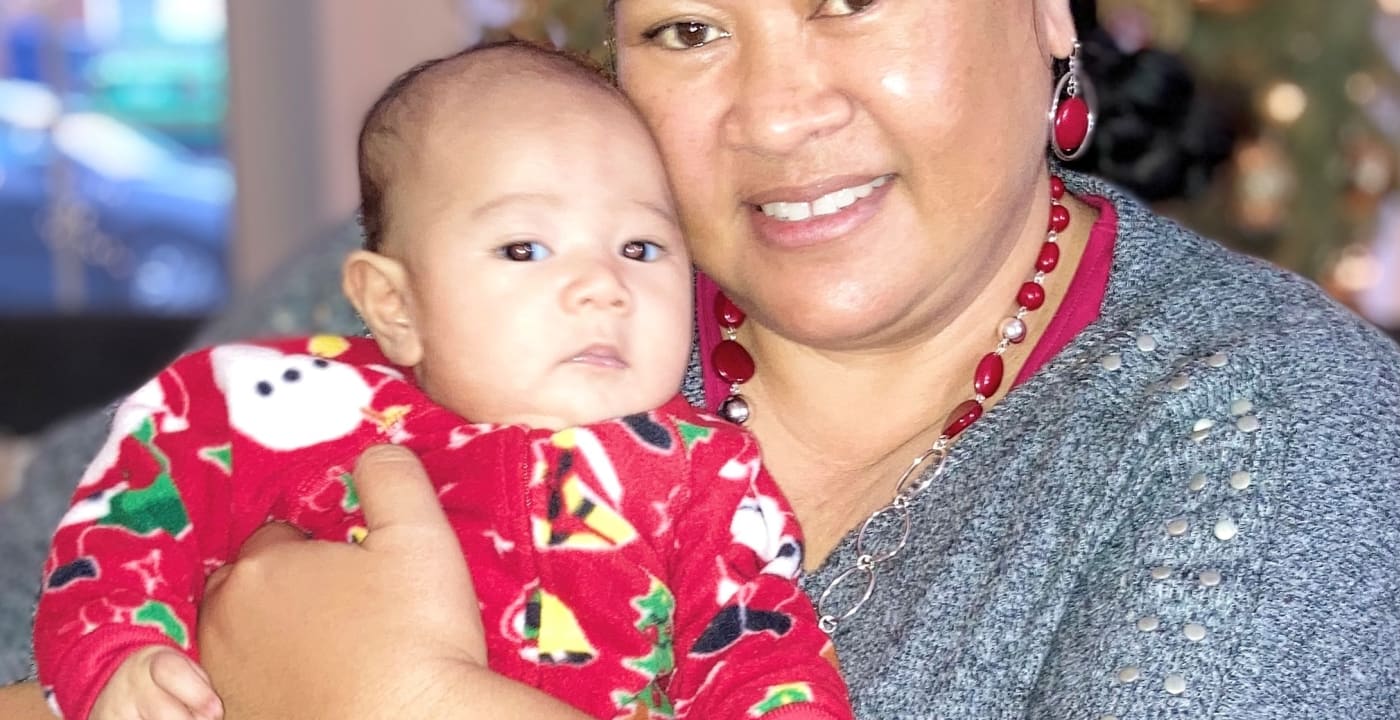Diagnosed with colorectal cancer while pregnant: Lynn’s story

In February of 2020, Lynn Tanuvasa, 42, received the news she was hoping not to hear: the colonoscopy she’d just had showed that she had colon cancer.
Then, just a few days later, Tanuvasa received even more life-changing news: she was pregnant.
As if that wasn’t enough, the borders of American Samoa, where Tanuvasa lives, were beginning to close due to the COVID-19 pandemic, her country was in the middle of a widespread measles outbreak, and Tanuvasa was caring for her five children, the youngest of whom was only six years old.
Because American Samoa doesn’t have the proper resources for treating colon cancer, she would need to be treated in the United States. And with no flights leaving her country, she wouldn’t be able to receive the care she needed anytime soon. All she could do was follow her doctor’s guidelines and simply wait.
“Every day it felt like, what’s going to happen to me? I didn’t know when I’d be able to leave the country for treatment or even where I’d go in the States yet. I wanted to keep my pregnancy but didn’t know whether I should. It was really hard,” she says.
Finally, in July — five months after her diagnosis — Tanuvasa was able to take a chartered flight to SeaTac so that she could stay with her family in Puyallup and who had been able to make an appointment for Tanuvasa with Kathleen Song, DO, with MultiCare Women’s Center – Bonney Lake. It would be Tanuvasa’s first time seeing a doctor outside of her home country.
An approach that “gave me hope”
Soon after Tanuvasa arrived in Washington State, she had her first appointment at MultiCare and began to receive care by a multidisciplinary team, including an OB/GYN, a medical oncologist, maternal fetal medicine specialists and a colorectal surgeon.
“What really struck me at first was how fast everything happened from that point on. And every time I visited a doctor before my surgery, they gave me hope. They would say, ‘Okay, you’re going to get through this.’ They would explain the procedure to me and what I could expect. And from then on I wasn’t scared, because of how they explained it to me. They really helped me through all of this from the beginning,” says Tanuvasa.
Doctors quickly performed a comprehensive panel of screenings and determined that the cancer hadn’t spread since earlier in the year and that the baby was doing well. Tanuvasa would need a colon resection to remove the cancer, but thankfully not chemotherapy or radiation, both of which are much harder on a fetus than surgery.
Minimally invasive surgery
Tanavasa’s surgeon, Laila Rashidi, MD, FACS, FASCRS, was able to perform her surgery using a minimally invasive robotic technique that doesn’t require a large incision in the abdomen. “It’s a great technology that’s very precise with much less manipulation of tissue, allowing for faster post-operative recovery, shorter hospital stays and less pain. It’s not always possible to use when a patient is 28 weeks pregnant due to exposure, but in this case it worked well,” says Dr. Rashidi.
MultiCare Colon and Rectal Surgery, where Tanuvasa was treated, follows an enhanced recovery protocol that encourages patients to eat and walk right after surgery. As a result, they’re typically able to go home within a day or two, says Dr. Rashidi.
For Tanuvasa, the surgery was a success and Dr. Rashidi was able to remove all the cancerous tissue with clean margins. Afterwards, Tanuvasa spent two nights in the hospital. “Because I was carrying, they wanted to make sure that everything was ok. But I didn’t experience any problems at all with the surgery and my baby stayed healthy throughout. So at that point, I was just excited to give birth in a few months,” she says.
The best birthday present
In October, after continuing to recover well from surgery, Tanuvasa gave birth to a healthy baby boy — on her birthday. The birth was also without complications and Tanuvasa was able to deliver vaginally without having to undergo a c-section.
Today, mom and baby are happy and healthy, and Tanuvasa is cancer-free. The two will be traveling home soon from Washington State to be reunited with the rest of their family in American Samoa on one of the scheduled repatriation flights.
As her ordeal comes to a close, Tanuvasa is relieved and grateful. She also hopes to spread a message to others about the importance of colon cancer screenings, a message that is even more meaningful to Tanuvasa because of her family history.
When Tanuvasa was in college, her mother was also diagnosed with colon cancer, but sadly succumbed to the disease at age 54. “When she was first having symptoms, my mom didn’t know what it was. Then when she found out, it was too late to cure. So I knew that, even though I was young, I needed to get checked not just for myself, but for my family and especially for my kids,” says Tanuvasa.
Early detection saves lives
Excluding skin cancers, colorectal cancer is the third most common cancer diagnosed in the US among both men and women, and rates are rising in young adults. But when detected early, colorectal cancers are very treatable.
Learn more about the risk factors of colorectal cancers, early symptoms to pay attention to and screening options near you.



